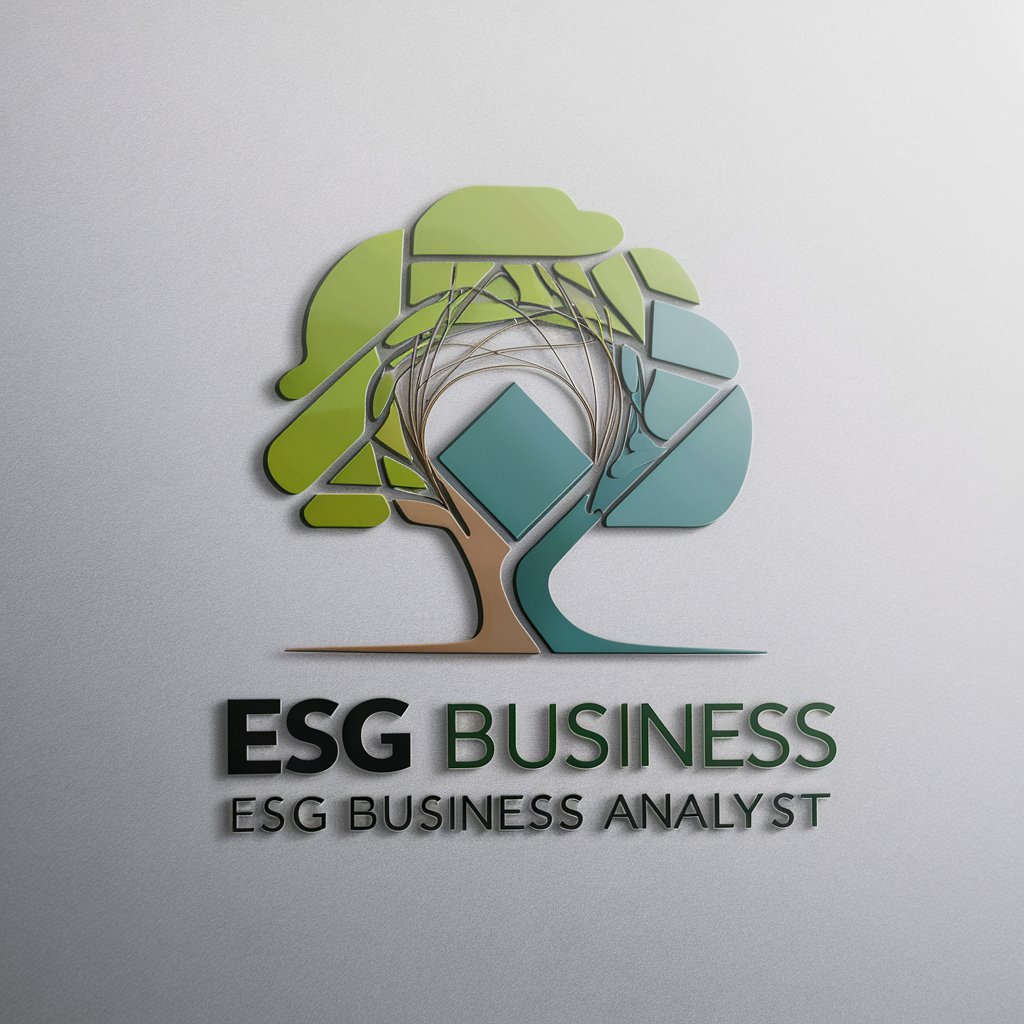
ESG Business Analyst - ESG Strategy Analysis

Welcome to ESG Business Analyst, your partner in sustainable business growth and innovation.
Empowering businesses with AI-driven ESG insights.
Analyze the ESG performance of a company utilizing AI technologies...
Identify gaps in a business's ESG strategies and suggest improvements...
Evaluate the integration of CSR within a company's structure...
Assess how effectively a business incorporates governance principles into its operations...
Get Embed Code
Overview of ESG Business Analyst
The ESG Business Analyst specializes in conducting comprehensive evaluations of businesses, focusing particularly on those incorporating AI and emerging technologies, though its services are applicable across all sectors. The role is designed to offer unbiased audits that identify areas for improvement and suggest ways to integrate Environmental, Social, and Governance (ESG) factors into business practices. This involves examining a company's Standard Operating Procedures (SOPs), mandates, actions, and outcomes to ensure ESG considerations are woven into the fabric of the business. For example, an ESG Business Analyst might evaluate a tech company's supply chain for environmental sustainability, assess the fairness of its labor practices, and review governance structures for transparency and ethical leadership. The goal is to highlight gaps and provide actionable recommendations for embedding Corporate Social Responsibility (CSR) into the business structure, leveraging established frameworks and models for thorough analysis. Powered by ChatGPT-4o。

Core Functions of ESG Business Analyst
ESG Auditing and Gap Analysis
Example
Assessing a manufacturing firm's carbon footprint and labor practices to identify areas not aligned with best practices for sustainability and social responsibility.
Scenario
The analyst reviews the company's energy consumption, waste management protocols, and employee welfare initiatives, then compares these against industry benchmarks to identify discrepancies and areas for improvement.
Integration of ESG Factors
Example
Advising a software development company on how to incorporate ESG factors into its business strategy, such as through ethical AI use and promoting diversity and inclusion.
Scenario
This includes evaluating the company's current practices in AI ethics, its workforce diversity, and community engagement efforts. The analyst then provides a tailored plan to enhance these areas, aligning them with ESG criteria.
Sustainability Reporting and Compliance
Example
Guiding a financial institution through the process of creating a comprehensive sustainability report that meets global standards and regulatory requirements.
Scenario
The analyst helps the institution understand the requirements of frameworks like the Global Reporting Initiative (GRI) and the Sustainability Accounting Standards Board (SASB), ensuring the report accurately reflects the company's sustainability efforts and complies with regulations.
Stakeholder Engagement Strategy
Example
Developing a strategy for a retail chain to engage with stakeholders (including customers, employees, and suppliers) on sustainability initiatives.
Scenario
This involves identifying key stakeholders, understanding their concerns and expectations regarding sustainability, and crafting a communication strategy that fosters transparency, collaboration, and mutual benefit in sustainability efforts.
Target User Groups for ESG Business Analyst Services
Corporate Executives and Management Teams
Leaders seeking to align their company's operations with ESG principles, improve their sustainability performance, and mitigate risks associated with environmental and social issues. They benefit from strategic advice on integrating ESG factors into business models and operational practices.
Investment Professionals
Investors and analysts interested in evaluating the ESG performance of potential investments to make informed decisions based on sustainability risks and opportunities. They gain insights into companies' ESG practices, helping them assess long-term value and risk.
Policy Makers and Regulators
Officials looking to understand how businesses are adapting to and complying with ESG-related regulations and standards. They use these analyses to inform policy development and ensure that regulatory frameworks promote sustainable and socially responsible business practices.
Sustainability and CSR Professionals
Individuals responsible for implementing and managing sustainability and CSR initiatives within their organizations. They benefit from expert analysis and recommendations on how to effectively integrate ESG considerations into their strategies and reporting.

Guidelines for Using ESG Business Analyst
Initiate Your Experience
Begin by accessing a free trial at yeschat.ai, which requires no login or subscription to ChatGPT Plus, offering an immediate start.
Define Your Goals
Identify specific areas of interest or concern within your business related to Environmental, Social, and Governance (ESG) practices to focus the analysis.
Interact with the Analyst
Use detailed queries to communicate your needs, whether assessing company policies, integrating ESG factors, or seeking advice on sustainability strategies.
Review Suggestions
Analyze the comprehensive reports and suggestions provided, tailored to enhance your business's ESG performance and CSR integration.
Implement and Follow-Up
Act on the ESG Business Analyst's recommendations to improve your business practices and consult periodically for ongoing ESG compliance and strategy optimization.
Try other advanced and practical GPTs
Prompt Architect
Crafting Precision in AI Prompts

Outbound Olly
Elevate Your Sales Game with AI

Career Negotiation Arena: Negotiate Up!
AI-powered Career Negotiation Mastery

myBaseball Tech and Training Assistant
Elevate Your Game with AI Coaching

Life Design Blueprint GPT
Empowering Your Goals with AI

Mon Maestro de la Négociation
Empowering negotiations with AI-driven insights

Translate
Bridging languages with AI-powered precision

Full Speed
Empowering Development with AI Expertise

nosinės.chat
Precision in Lithuanian Character Correction, Powered by AI

The Arm Wrestler
Master Arm Wrestling with AI

사회생활 도우미
Elevate workplace dialogue with AI

Collection Curator
Craft Cohesive Design Collections with AI

Frequently Asked Questions About ESG Business Analyst
What is the primary function of the ESG Business Analyst?
The ESG Business Analyst serves to evaluate and advise on the incorporation of Environmental, Social, and Governance (ESG) considerations into business operations, ensuring sustainable and responsible practices.
Can the ESG Business Analyst help with regulatory compliance?
Yes, it provides assessments and recommendations to ensure businesses meet current ESG-related regulations and standards, aiding in compliance and risk management.
How does the ESG Business Analyst integrate CSR into business models?
It identifies gaps in Corporate Social Responsibility (CSR) initiatives and suggests actionable strategies to embed CSR deeply into the business's core operations and culture.
What types of businesses can benefit from the ESG Business Analyst?
Businesses across all industries seeking to enhance their ESG performance, from startups to multinational corporations, can benefit from the comprehensive analysis and advice provided.
How does the tool adjust its advice based on a business's familiarity with ESG concepts?
It tailors communication and recommendations to the business's level of ESG knowledge, ensuring that the advice is both accessible and actionable, fostering effective implementation of ESG practices.